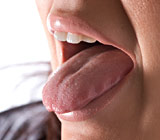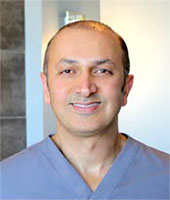Bad Breath or Halitosis in Los Angeles
 Bad breath, or halitosis, is bad news in any social situation — whether you’re having an intimate conversation with a date or simply saying hello as you shake someone’s hand. Halitosis, from the Latin halitus (exhalation) and the Greek osis (a condition or disease causing process), can also be a warning that something’s amiss healthwise — usually in your mouth (85% to 90% of the time) but sometimes elsewhere in your body.
Bad breath, or halitosis, is bad news in any social situation — whether you’re having an intimate conversation with a date or simply saying hello as you shake someone’s hand. Halitosis, from the Latin halitus (exhalation) and the Greek osis (a condition or disease causing process), can also be a warning that something’s amiss healthwise — usually in your mouth (85% to 90% of the time) but sometimes elsewhere in your body.
Most Common Causes of a Malodorous Mouth
Most unpleasant odors emanating from the mouth result from the processing of food remnants by certain strains of bacteria that typically populate the oral environment. As they feed on food particles, these microbes produce nasty-smelling byproducts — mostly volatile sulfur compounds, which have a distinctive “rotten egg” odor. That’s why diligent dental care is front and center when it comes to banishing bad breath. Brushing, flossing and routine professional cleanings will help ensure that traces of last night’s dinner or your midday candy bar don’t stick around for bacteria to dine on.
Especially important, but often overlooked, during routine home oral care is the back of the tongue. This is actually the most common location for mouth-related bad breath to develop. Unlike the front of your tongue, which is bathed in saliva, the back of the tongue is relatively dry and poorly cleansed — an ideal setting in which microbe-laden plaque can form and flourish.
Even if you’re industrious when it comes to brushing and flossing, food debris can get trapped and plaque can build up in hard-to-reach places such as between teeth (interdental), under the gums (subgingival) and around faulty dental work (e.g., ill-fitting crowns or veneers) contributing to overall oral odor. Other culprits include unclean dentures and oral disease such as tooth decay, gum disease, and abscesses.
Halitosis may accompany dry mouth, or xerostomia (xero – dry, stomia – mouth), a condition in which the normal flow of saliva, which cleanses the oral environment and keeps odor-producing bacteria in check, is interrupted. Most of us wake up with a temporary case of halitosis or “morning breath” because our salivary glands are less active while we sleep, but it usually disappears after a good brushing. If dry mouth is persistent, other possible triggers include: breathing through your mouth, a medication side effect, fasting or dehydration, or even stress.
Clearly, maintaining or restoring a healthy oral environment is your greatest defense against halitosis. Take care of your teeth and there’s no reason your breath should be any less attractive than your smile!
If you would like more information about halitosis and ways to prevent or treat it, please contact us or schedule an appointment for a consultation. You can also learn more about this topic by reading the Dear Doctor magazine article “Bad Breath.”
If you have questions about mouthguards, please contact us or schedule an appointment for a consultation.You can also learn more about this topic by reading the Dear Doctor magazine article “Bad Breath.”

